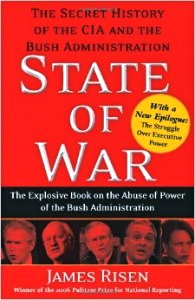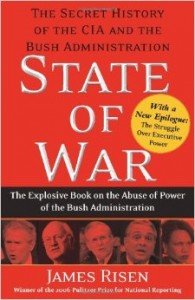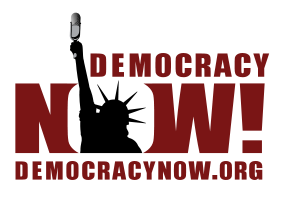James Risen

James Risen Prepared to “Pay Any Price” to Report on War on Terror Amid Crackdown on Whistleblowers
 James Risen has broken story after story on the abuses of power of the Bush administration.
James Risen has broken story after story on the abuses of power of the Bush administration.
From warrantless wiretapping to secret financial data mining to the CIA’s rogue operations, he has shown again and again that the executive branch has dangerously overreached, repudiated checks and balances on its power, and maintained secrecy even with its allies in Congress. In no small part thanks to Risen and State of War, the “secret history” of the Bush years has now come partially into view. In a new epilogue for the paperback edition, Risen describes the two-front war that President Bush is now fighting: at home against Congress and the Supreme Court, as his administration is increasingly reined in from its abuses; and in the Middle East, where George W. Bush’s great gamble to bring a democratic revolution is failing radically. We must learn the lessons of Risen’s history now, before it is too late.
 We spend the hour with veteran New York Times investigative reporter James Risen, the journalist at the center of one of the most significant press freedom cases in decades. In 2006, Risen won a Pulitzer Prize for his reporting about warrantless wiretapping of Americans by the National Security Agency. He has since been pursued by both the Bush and Obama administrations in a six-year leak investigation into that book, “State of War: The Secret History of the CIA and the Bush Administration.” Risen now faces years in prison if he refuses to testify at the trial of a former CIA officer, Jeffrey Sterling, who is accused of giving him classified information about the agency’s role in disrupting Iran’s nuclear program, which he argues effectively gave Iran a blueprint for designing a bomb. The Obama administration must now decide if it will try to force Risen’s testimony, despite new guidelines issued earlier this year that make it harder to subpoena journalists for their records. Risen’s answer to this saga has been to write another book, released today, titled “Pay Any Price: Greed, Power, and Endless War.” “You cannot have aggressive investigative reporting in America without confidential sources — and without aggressive investigative reporting, we can’t really have a democracy,” Risen says. “I think that is what the government really fears more than anything else.” Risen also details revelations he makes in his new book about what he calls the “homeland security-industrial complex.”
We spend the hour with veteran New York Times investigative reporter James Risen, the journalist at the center of one of the most significant press freedom cases in decades. In 2006, Risen won a Pulitzer Prize for his reporting about warrantless wiretapping of Americans by the National Security Agency. He has since been pursued by both the Bush and Obama administrations in a six-year leak investigation into that book, “State of War: The Secret History of the CIA and the Bush Administration.” Risen now faces years in prison if he refuses to testify at the trial of a former CIA officer, Jeffrey Sterling, who is accused of giving him classified information about the agency’s role in disrupting Iran’s nuclear program, which he argues effectively gave Iran a blueprint for designing a bomb. The Obama administration must now decide if it will try to force Risen’s testimony, despite new guidelines issued earlier this year that make it harder to subpoena journalists for their records. Risen’s answer to this saga has been to write another book, released today, titled “Pay Any Price: Greed, Power, and Endless War.” “You cannot have aggressive investigative reporting in America without confidential sources — and without aggressive investigative reporting, we can’t really have a democracy,” Risen says. “I think that is what the government really fears more than anything else.” Risen also details revelations he makes in his new book about what he calls the “homeland security-industrial complex.”
AMY GOODMAN: Today we spend the hour with the journalist at the center of one of the most significant press freedom cases in decades: veteran New York Times investigative reporter James Risen. In 2006, Risen won a Pulitzer Prize for his reporting about warrantless wiretapping by the National Security Agency. His story would have come out right before the 2004 presidential election of President Bush over John Kerry. It might have changed the outcome of that election. But under government pressure, The New York Times refused to publish the story for more than a year, until James Risen was publishing a book that would have had the revelations in it. He’s since been pursued by both the Bush and Obama administrations in a six-year leak investigation into that book, State of War: The Secret History of the CIA and the Bush Administration.
James Risen now faces years in prison if he refuses to testify at the trial of a former CIA officer accused of giving him classified information. In June, the Supreme Court turned down his appeal of a court ruling forcing him to testify in the criminal trial of ex-CIA analyst Jeffrey Sterling, who prosecutors believe gave him information on the agency’s role in disrupting Iran’s nuclear program. In State of War, Risen showed that instead of hampering Iran’s efforts, the CIA effectively gave Iran a blueprint for designing a bomb. James Risen has vowed to go to jail rather than testify at Sterling’s trial, which is set to begin in January.
In a story broadcast Sunday, General Michael Hayden, who led the CIA until 2009 and, before that, led the NSA, told Lesley Stahl on 60 Minutes he does not think Risen should be forced to divulge his source.
MICHAEL HAYDEN: I’m conflicted. I know the damage that is done. And I do. But I also know the free press necessity in a free society. And it actually might be that I think, no, he’s wrong, that was a mistake, that was a terrible thing to do, America will suffer because of that story. But then I have to think about: So, how do I redress that? And if the method of redressing that actually harms the broad freedom of the press, that’s still wrong. The government needs to be strong enough to keep me safe, but I don’t want it so strong that it threatens my liberties.
AMY GOODMAN: Well, the Obama administration must now decide if it will try to force James Risen’s testimony and risk sending one of the nation’s most prominent national security journalists to jail. President Obama has already developed a reputation as the most aggressive in history when it comes to targeting whistleblowers. His Justice Department has brought eight cases so far, more than all previous administrations combined. On Friday, federal prosecutors hinted they may decide not to press for Risen’s testimony, under new guidelines issued earlier this year that make it harder to subpoena journalists for their records.
http://www.democracynow.org/2014/10/14/james_risen_prepared_to_pay_any

